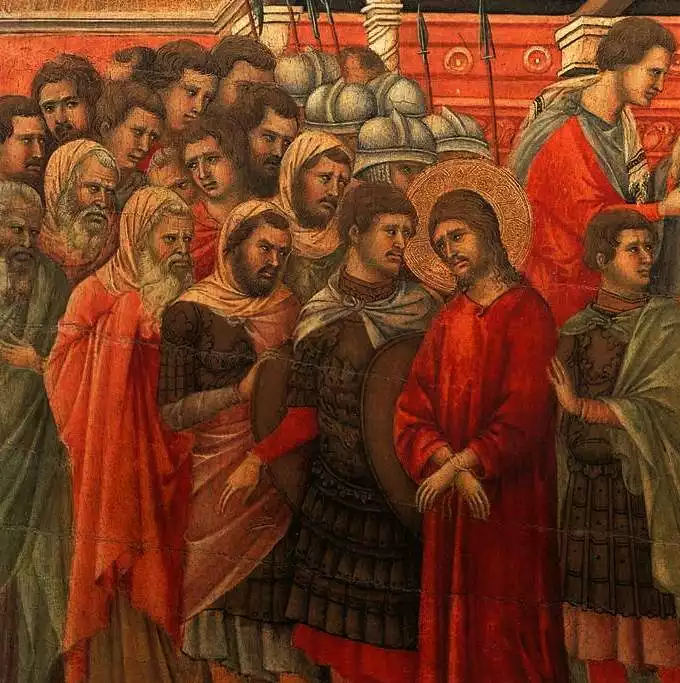
In the Easter story, Pontius Pilate offered the mob a stark choice – condemn Jesus to crucifixion, or set free Barabbas, a convicted murderer and insurrectionist. To Pilate’s astonishment, they cried for Barabbas’ release over the innocent Christ. So as Jesus was led away to be executed in his place, Barabbas escaped the death he deserved. His undeserved pardon foreshadowed Christ’s own death to free humanity from the wages of sin.
The Guilty Freed As The Innocent Condemned: The Haunting Tale of Barabbas’ Undeserved Pardon
In the days leading up to the Passover feast in Jerusalem around 30 AD, tensions were high as the city swelled with Jewish pilgrims. The Roman prefect Pontius Pilate had recently ordered the brutal suppression of a messianic movement led by Jesus of Nazareth. Jesus was arrested, quickly tried and condemned to crucifixion on charges of sedition against Rome.
On the eve of the public spectacle of Jesus’ execution, Pilate had one last duty to uphold—an annual custom of freeing a Jewish prisoner as an act of mercy during Passover. That prisoner was Barabbas, who had been imprisoned for taking part in an earlier violent uprising against Roman rule and committing murder in the process.
So the next morning, Pilate gathered the crowd and presented the condemned Jesus alongside Barabbas. He offered to release one man in observance of the Passover pardon. The crowd erupted, demanding freedom for Barabbas rather than Jesus. Mark’s gospel presents Barabbas as a kind of symbolic antitype to Christ—a convicted insurrectionist and murderer whose name ironically means “son of the father” in Aramaic.
Pilate was astonished at their choice, seeing no fault in Jesus to warrant death. But the crowd only grew more agitated, shouting “Crucify him!” about the innocent Jesus. Pilate finally relented and freed Barabbas. Jesus was then brutally beaten by soldiers, mocked with a crown of thorns, forced to carry his cross through the streets and crucified naked and bloody between two thieves at Golgotha.
No further details are known about Barabbas from the gospels. Despite being guilty of serious crimes against Rome, he was pardoned according to the Passover custom while Jesus took his place, bearing the sins of the world. This unjust exchange foreshadowed Christ’s role as the sacrificial Lamb of God who dies to free humanity from the wages of sin. Unlike Barabbas’ fate, Jesus’ crucifixion was followed by the miracle of the resurrection on the third day, making possible the gift of eternal life for all who put their faith in Him.
Conclusion
Barabbas remains a shadowy yet important biblical figure. His undeserved pardon on what would become the first Good Friday underscored the injustice carried out against Jesus Christ that day. While Barabbas escaped crucifixion, Christ died in his place for a world’s sins. This foreshadowed Jesus’ role as the sacrificial Passover lamb whose blood would bring salvation. Barabbas’ release chillingly presaged the NPC crowd’s fickle cries to first hail then condemn Jesus days later. The story reminds us how Christ’s sacrificial death offers humanity undeserved grace and mercy – freeing us from sin’s grip the way Barabbas was freed from the cross that should have held him. No other biblical account so starkly contrasts divine pardon with earthly injustice.
References
Sanders, E.P. Jesus and Judaism. Augsburg Fortress Publishers, 1987.
Evans, C.A. and Porter, S.E. Dictionary of New Testament Background. InterVarsity Press, 2000.
Blomberg, C. Jesus and the Gospels. B&H Academic, 1997.
Josephus, F. Antiquities of the Jews. Harvard University Press, 1930.
Brown, R.E. The Death of the Messiah. Yale University Press, 1998.
Carson, D.A. and Moo D.J. An Introduction to the New Testament. Zondervan, 2005.
